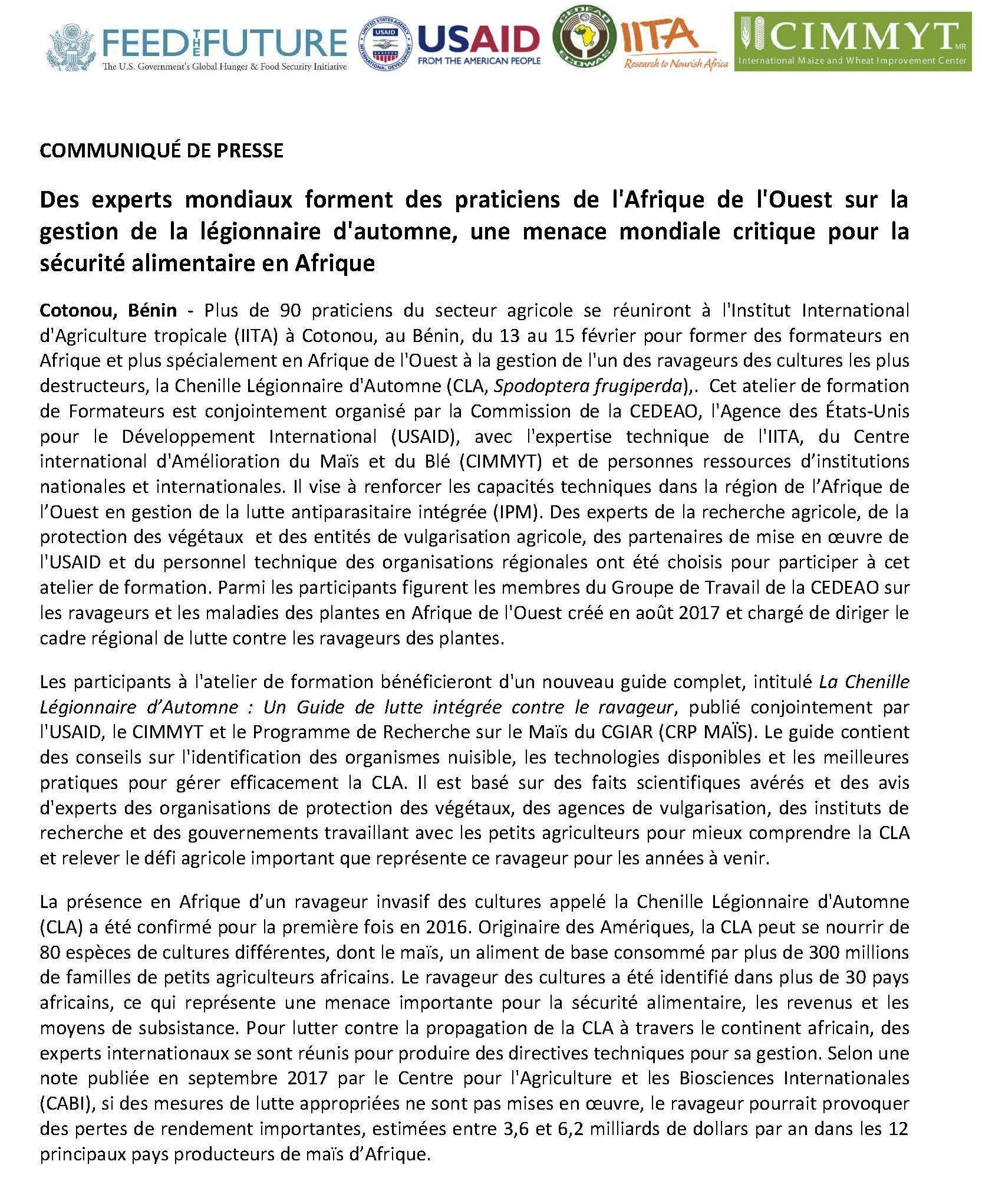Press Release Shim
Speeches Shim
For Immediate Release
Global experts train West African practitioners on Fall Armyworm management, a critical global food security threat in Africa
Cotonou, Benin - Over ninety agriculture sector practitioners will meet at the facilities of the International Institute of Tropical Agriculture (IITA) in Cotonou, Benin, on February 13-15 to train trainers on the management of one of the most destructive crop pests, the Fall Armyworm (FAW; Spodoptera frugiperda) in Africa, with particular focus on West Africa. Jointly convened by the ECOWAS Commission, the United States Agency for International Development (USAID), with the technical expertise of IITA, the International Maize and Wheat Improvement Center (CIMMYT), and resource persons from international and national research and development institutions, the training is aimed at building technical capacity in the West Africa region in integrated pest management (IPM)-based FAW management. Selected experts from agricultural research, plant protection, and agricultural extension entities, USAID implementing partners, and technical staff of regional organizations will participate in this training workshop. Of those participating are the members of the ECOWAS West Africa Plant Pest and Disease Task Force established in August 2017 and charged with leading the regional framework for plant pest management.
Participants of the training workshop will benefit from a new comprehensive IPM guide, titled Fall Armyworm in Africa: A Guide for Integrated Pest Management was jointly produced under the U.S. Government’s Feed the Future initiative by USAID, CIMMYT and the CGIAR Research Program on Maize (CRP MAIZE). The guide contains tips on pest identification, available technologies, and best practices for effectively managing FAW. It is based on scientific evidence and expert opinion from plant protection organizations, extension agencies, research institutions, and governments working with smallholder farmers to better understand FAW and to tackle the significant agricultural challenge the pest poses to Africa for years to come.
In 2016, an invasive crop pest called the fall armyworm (FAW) was first confirmed in Africa. Native to the Americas, FAW can feed on 80 different crop species including maize, a staple food consumed by over 300 million African smallholder farm families. The crop pest has been identified in over 30 African countries, posing a significant threat to food security, income and livelihoods. To combat the spread of FAW across the African continent, international experts gathered together to produce technical guidelines for FAW management. If proper control measures are not implemented, the pest could cause extensive maize yield losses, estimated between $3.6 and $6.2 billion per year across the 12 major African maize producing countries, according to an evidence note published by the Centre for Agriculture and Biosciences International (CABI) in September 2017.
Immediately following the FAW training workshop, ECOWAS Commission will convene the West African Plant Protection Task Force for Surveillance, Prevention and Control of plant Pests, comprised of plant protection officers from the Member States of ECOWAS. The objective of the Task Force meeting will be to review country progress and challenges since its inception in August, identify regional priorities, develop an action plan for 2018 and 2019, and agree on a common agenda for West African contributions to the international Commission on Phytosanitary Measures meeting in April 2018 in Italy.
Fall Armyworm Press Release ![]() (pdf - 347k)
(pdf - 347k)
FOR FURTHER INFORMATION:
- U.S. Government’s Feed the Future initiative, United States Agency for International Development (USAID); West Africa, Accra, Ghana. chamlin@usaid.gov; Seydou.Samake@fas.usda.gov; ssamake@usaid.gov
- International Maize and Wheat Improvement Center, Nairobi, Kenya. b.m.prasanna@cgiar.org
- Directorate of Agriculture and Rural Development, ECOWAS Commission, Abuja, Nigeria. syalaintraore@yahoo.fr ; atraore@ecowas.int ; bgnonlonfin74@gmail.com
- International Institute of Tropical Agriculture, Cotonou, Benin. G.Goergen@cgiar.org
Related Press Releases
- USAID Provides an Additional $136.5 Million in Nigeria Under Our Seven-Year Development Agreement
- Beninese Entrepreneurs Prevent COVID-19 with United States Support
- United States Announces Nearly $152 Million in New Humanitarian Assistance in the Central Sahel Countries of Niger, Mali, Burkina Faso, and Mauritania


Comment
Make a general inquiry or suggest an improvement.